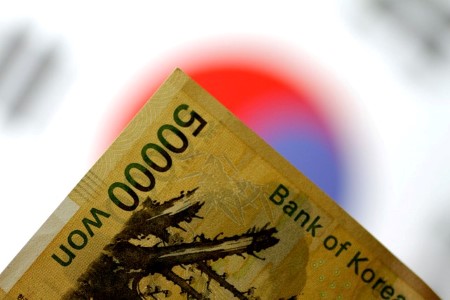South Korean won, Taiwan dollar recover
Chinese yuan flat, stocks down on weak economic sentiment
Pakistan equities, bond yield fall after military strike
Updates with 0650 GMT
By Archishma Iyer
Jan 18 (Reuters) –Most Asian currencies were muted on Thursday, while equities struggled to make headway, as investors digested adim economic outlook from the region’s largest economy coupled with paring back of bets on early ratecuts in the United States.
The MSCI emerging markets currencies index .MIEM00000CUS hovered near a one-month low, as of 0650 GMT.
The dollar index =USD,which measures the greenback against six major rivals, was perched at 103.2.
Investors maintained a cautious stance following weak economic data fromChina, Asia’s largest trading partner, showingthe persistent pressure of a protracted property crisis and subdued demand.
The yuan CNY=CFXS was flat, while Chinese stocks .SSEC fell as much as 2.6% to hit almost a three-year low.
Stronger U.S.retail sales data showed that the Federal Reserve may not quickly move to slash interest rates, with the CME FedWatch tool now showing a rough 60% chance of a rate cut in March, down from about 70% previously.
The South Korean won KRW=KFTC was thelead gainer for the day in the region, rising as much as 0.3%, although itlingered near its November lows. The Taiwan dollar TWD=TP reversed gains to end flat.
“Asian currencies, mainly the Korean won and Taiwan dollar have seen quite a tear of late, given the less favourable mix of sell-off in equities, higher yields, China growth concerns and geopolitical risks,” said Christopher Wong, a currency strategist at OCBC.
Wong, however, sees a return of portfolio inflows into Asia as central bank pivots are still expected this year.
Citi analysts estimated there was a combined $5.2 billion of net capital outflows in Asia due to a dollar short squeeze, particularly from Taiwan, South Korea and China, the largest since China’s COVID-19 lockdowns and the Russia-Ukraine conflict’s escalation in March 2022.
Other Asian currencies such as the Philippines’ peso PHP= eked out marginal gains, while the Indonesian rupiah IDR= and the Malaysian ringgit MYR= wereflat. The Thai baht THB=TH fell marginally.
Among Asian equities, those in Singapore .STI, Manila .PSI, Mumbai .NSEI and Kuala Lumpur .KLSE were down between 0.1% and 1.1%, while Jakarta .JKSE and Taipei markets .TWII rose 0.6% and 0.4%, respectively.
Pakistan’s benchmark index .KSE fell as much as 1.6% after the country conducted strikes inside Iran targeting separatist militants, while the benchmark 10-year bond yield PK10YT=RR fell as much as 1.6%, hitting its lowest since early February 2023.
HIGHLIGHTS:
** Indonesia’s benchmark 10-year bond yield falls to 6.692%
** India’sLTIMindtree punished for “overpromising and underdelivering”
** Vietnam tightens limits on investors’ stakes in banks
|
Asia stock indexes and currencies at 0650 GMT |
||||||
|
COUNTRY |
FX RIC |
FX DAILY % |
FX YTD % |
INDEX |
STOCKS DAILY % |
STOCKS YTD % |
|
Japan |
JPY= |
+0.22 |
-4.57 |
.N225 |
–0.03 |
5.98 |
|
China |
CNY=CFXS |
+0.03 |
-1.34 |
.SSEC |
-0.92 |
-5.63 |
|
India |
INR=IN |
+0.01 |
+0.10 |
.NSEI |
-0.31 |
-1.04 |
|
Indonesia |
IDR= |
+0.06 |
-1.47 |
.JKSE |
0.68 |
-0.32 |
|
Malaysia |
MYR= |
+0.02 |
-2.63 |
.KLSE |
-0.81 |
1.68 |
|
Philippines |
PHP= |
+0.09 |
-0.83 |
.PSI |
-1.10 |
0.78 |
|
S.Korea |
KRW=KFTC |
+0.34 |
-3.86 |
.KS11 |
0.17 |
-8.11 |
|
Singapore |
SGD= |
+0.16 |
-1.74 |
.STI |
-0.15 |
-3.17 |
|
Taiwan |
TWD=TP |
-0.03 |
-2.74 |
.TWII |
0.38 |
-3.92 |
|
Thailand |
THB=TH |
-0.01 |
-3.91 |
.SETI |
0.10 |
-2.39 |
Reporting by Archishma Iyer in Bengaluru; Editing by Jamie Freed and Eileen Soreng















